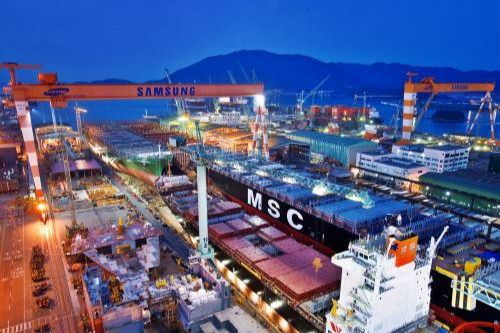Samsung Heavy Industries Faces Allegations of Migrant Worker Discrimination & Rights Violations in South Korea
 South Korea
Labor Rights
South Korea
Labor Rights

Samsung Heavy Industries faces allegations of migrant worker discrimination, including forced resignations, unfair wage deductions for meals, and a humiliating
Samsung Heavy Industries Under Scrutiny for Alleged Migrant Worker Abuses
Samsung Heavy Industries (SHI) is currently embroiled in serious allegations concerning its treatment of migrant workers at its shipyard on Geoje Island, South Gyeongsang Province. A union representing subcontracted shipyard workers, affiliated with the Korean Metal Workers’ Union (KMWU), has brought forth claims of unfair dismissals, wage withholding, and systemic human rights violations against the shipbuilding giant.
Unfair Dismissals and Contractual Breaches
The union contends that SHI unfairly forced three migrant employees, working under E-7-3 skilled worker visas, to resign this month. These workers, who had two-year contracts, had only been with the company for approximately six months. The KMWU argues that it is implausible for these individuals to have voluntarily resigned, especially given that each worker reportedly paid a substantial sum – at least 10 million won (approximately $6,800) – to secure their employment in Korea. A voluntary resignation would necessitate their immediate return home, incurring significant financial loss.
The union highlighted the inconsistency, stating, “If their skills were unsatisfactory, the employer could simply decide not to renew their contracts once the terms expired.” It further noted that even in cases of non-renewal, migrant workers typically have the option to seek alternative employment through a D-10 visa, designed for job seekers, implying no rational incentive for voluntary early resignation.
Discriminatory Practices in Meal Services
Another significant allegation points to discriminatory practices in meal services. Unlike their Korean counterparts, who enjoy free lunches and pay a nominal 1,000 won for breakfast and dinner, migrant workers have reportedly faced a monthly deduction of 180,000 won from their salaries for meals since last year. This deduction occurs irrespective of whether they actually consume the meals provided.
The KMWU suggests this system serves as a mechanism for the company to reduce overall labor costs. “The deduction allows the company to pay lower overall wages while still meeting the legal requirement to provide a salary equal to at least 80 percent of the annual per capita gross national income,” the union explained, implying a loophole exploited to the detriment of migrant workers.
The Humiliating “Yellow and Red Card” System
The union also cited SHI's “yellow and red card” system as a clear instance of human rights infringement. This controversial practice involves publicly displaying yellow or red cards in common areas to admonish migrant workers for issues related to safety, quality control, or performance. The union strongly condemned this method, emphasizing its humiliating nature and pointing out that such a system is not applied to Korean workers.
Broader Context: Presidential Condemnation of Migrant Worker Abuse
These allegations against Samsung Heavy Industries emerge against a backdrop of increasing national concern over migrant worker rights. In July, President Lee Jae Myung publicly condemned discrimination and abuse targeting migrant workers as “serious crimes.” His remarks followed the revelation of disturbing footage showing a Sri Lankan worker being tied to a forklift at a brick factory in Naju, South Jeolla Province, underscoring the severity of such issues within the country.
SHI's Response
In response to the mounting claims, Samsung Heavy Industries has stated that it is currently reviewing the union’s allegations to verify their accuracy and determine appropriate next steps.